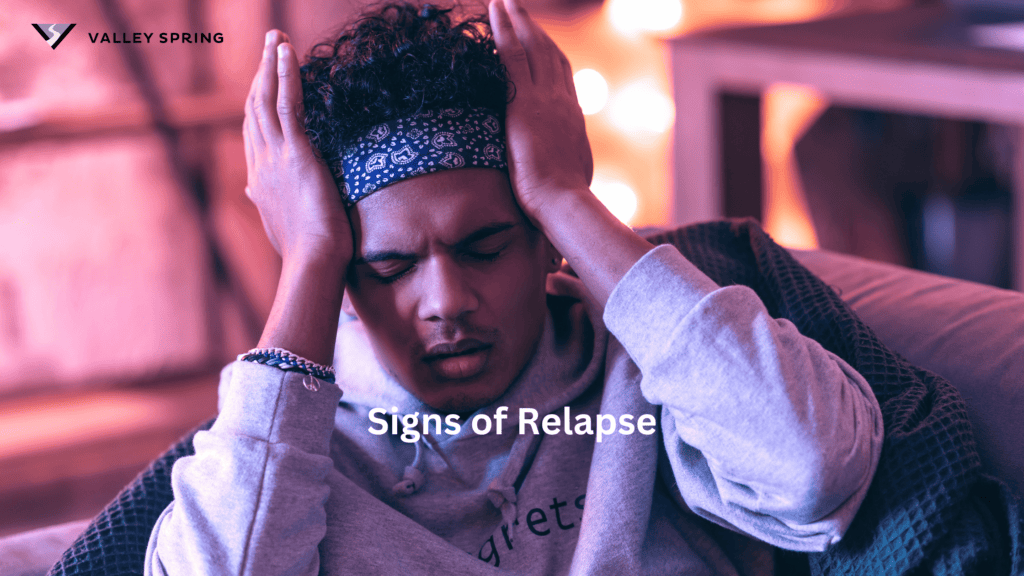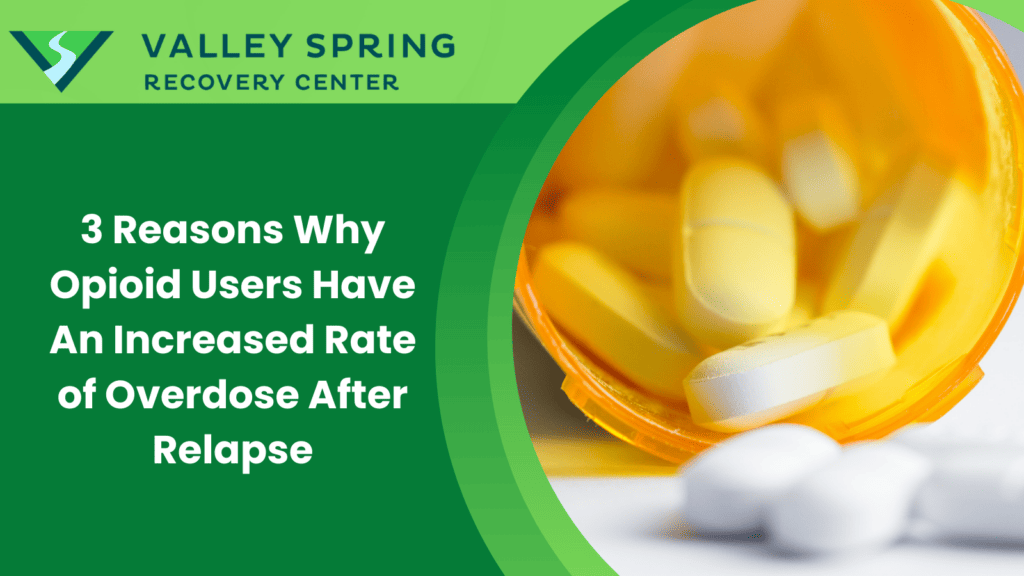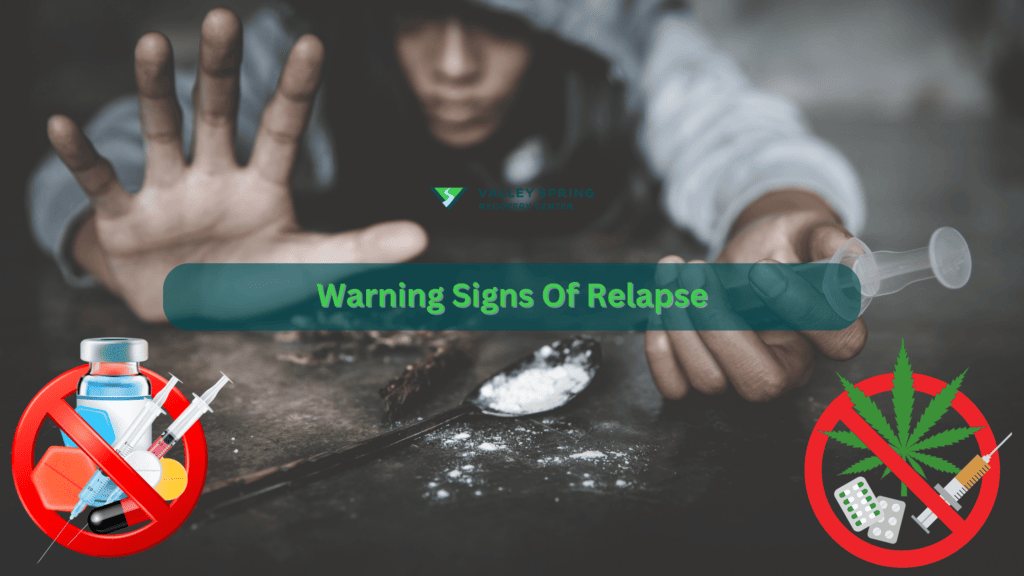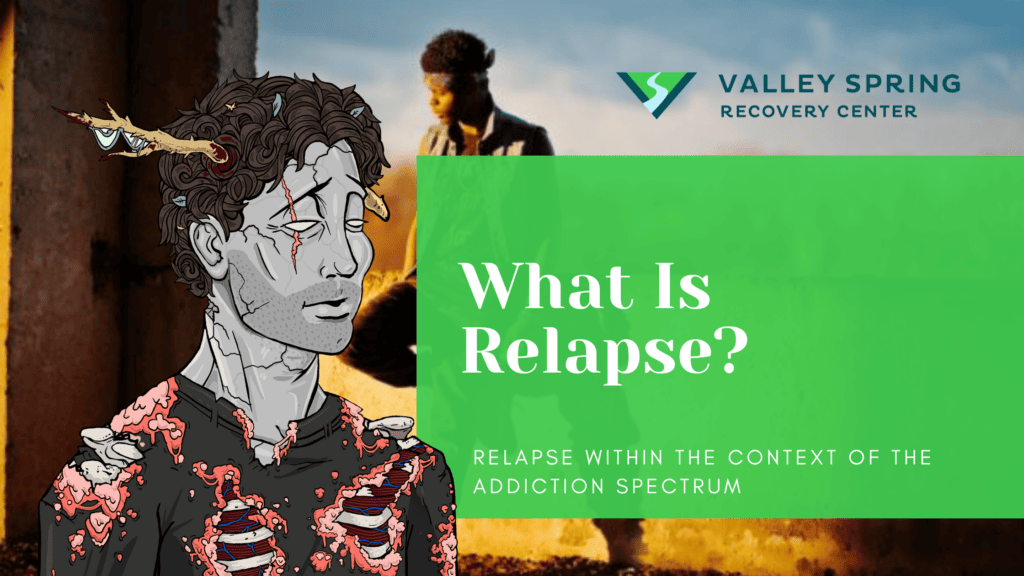Wondering what are the early warning signs of relapse? In mental health, relapse involves the return of symptoms after recovery, occurring in phases with a specific pattern for each person. Recognizing these patterns is essential for managing uncomfortable feelings during recovery. Understanding the relapse process, common warning signs, and the importance of maintaining balance can significantly contribute to effective addiction treatment. Seeking support, asking for help, and taking proactive measures are essential for navigating the challenges of addiction and relapse.
Relapse is a common challenge faced by many on the path to recovery from addiction. Understanding the warning signs, stages, and triggers of relapse is crucial for preventing a return to substance use. With the right knowledge and coping skills, one can maintain long-term sobriety and successfully navigate the journey of addiction recovery.
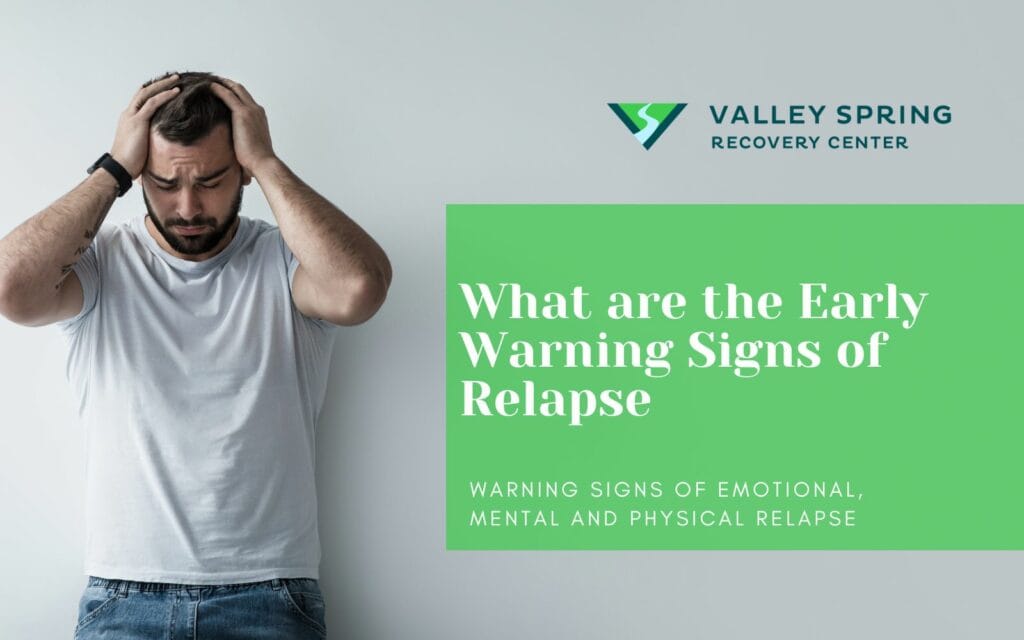
What is a relapse?
A relapse means a return to heavy and frequent substance use that existed before treatment or the commitment to change. It is a vital element of the addiction treatment and recovery process, where individuals may undergo a recurrence of intense drug or alcohol use. This can be contrasted with a slipup, a short-lived lapse often accidental, reflecting the inadequacy of coping strategies in a high-risk situation, which is part of the relapse process.
Relapse takes place when symptoms of a condition reappear after a period of improvement, indicating the complexities of the recovery process. In addition, relapse specifically refers to a person engaging in the worsening of substance use after showing initial improvement. Understanding the relapse process involves recognizing the delicate balance in an individual’s life between perceived external demands and internally fulfilling or enjoyable activities, as highlighted by the National Institutes of Health (.gov). This balance plays a crucial role in relapse prevention.
In mental health, relapse is characterized by the onset of symptoms after recovery, occurring in phases with a specific pattern for each person. Recognizing these patterns is essential for individuals dealing with uncomfortable feelings during the recovery process. Taking action, asking for help, and addressing sleeping habits are critical steps to manage the third and final stage of the relapse process.
Understanding the relapse process, common warning signs, and the importance of maintaining balance in life can significantly contribute to effective addiction treatment. To navigate the challenges of addiction and relapse, individuals must seek support, ask for help, and take proactive measures.
Understanding the relapse process, common warning signs, and the importance of maintaining balance in life can significantly contribute to effective addiction treatment. To navigate the challenges of addiction and relapse, individuals must seek support, ask for help, and take proactive measures.
Top 3 Stages of Relapse: Emotional, Mental, and Physical
Emotional Relapse
Emotional relapse is the first stage of relapse, marking the initial phase in a slow process that unfolds through three stages: emotional, mental, and physical. In this stage, characterized by poor self-care, individuals may not actively consider substance use, but their emotions and behaviors set the stage for a potential relapse.
Individualized treatment is crucial to address the underlying emotional issues during emotional relapse, fostering a solid recovery and helping individuals navigate the next stages.
Understanding emotional relapse as the first stage of relapse is essential for individuals seeking a successful recovery. It requires a comprehensive and individualized approach, fostering proper treatment, and addressing common addiction triggers to pave the way for a solid and sustained recovery journey.
The emotional relapse stage refers to the initial phase of relapse, which is typically characterized by negative emotions such as irritability, anxiety, or anger. Warning signs of emotional relapse include:
Suppressing emotions
Social withdrawal
Skipping support group sessions
Attending support group sessions but not participating
Concentrating on others’ problems
Unhealthy eating and sleeping habits
These warning signs are often caused by poor self-care.
Mental Relapse
Mental relapse is characterized by a deterioration of mental health symptoms. Recognizing the signs of mental relapse is crucial for individuals navigating the challenges of mental health. It involves identifying warning signs such as a craving for drugs or alcohol and thoughts about people, places, and things associated with substance use. This recognition is essential for early intervention and seeking outside help when needed.
Understanding mental relapse involves acknowledging that it can be triggered by outside life events, such as life transitions or family emergencies. Additionally, changes in behaviors, such as discontinuing gym attendance or losing access to a support network, may contribute to the onset of mental health relapse.
Mental relapse is characterized by an internal struggle between the craving to utilize substances and the aspiration to stay sober. Signs such as:
Craving for drugs or alcohol
Reminiscing about people, places, and things associated with past use
Minimizing the consequences of past use or romanticizing past use
Bargaining
Lying
Devising strategies to better control using
Seeking relapse opportunities
Planning a relapse
These signs may indicate a potential relapse in mental health.
Managing mental relapse may involve:
Speaking with a supportive friend or family member
Engaging in a healthy activity to distract oneself
Reflecting on the potential negative consequences of substance use
Preventing further progression and maintaining long-term recovery ne
Physical Relapse
Physical relapse is the final step in the three-stage process of relapse, marking the continuation of substance use. Early intervention during emotional and mental relapse is crucial in preventing the progression to physical relapse. The most common time for relapse varies, often occurring in the early stages of recovery.
Individuals in long-term recovery need to be aware that physical relapse can occur, especially when the person isn’t actively thinking about using. The process of drug addiction relapse involves distinct stages, with the full relapse, or the return to active addiction, being a significant risk for those in recovery. Recognizing warning signs, such as depression and stress, is crucial to understanding the risk of relapse.
In support groups and treatment programs, individuals can find valuable resources and a community to navigate the challenges of recovery. Being vigilant about the warning signs to look out for and having a strong support group can help mitigate the risk of physical relapse. A person in recovery needs to think about using as a potential risk and actively engage in strategies and activities that foster a healthy and drug-free lifestyle.
What Are The Important Warning signs of Of Relapse?
Relapse is characterized as a reoccurrence of drug abuse after a period of abstinence. Preventing a recurrence of substance use necessitates recognizing the early warning signs of relapse. The three stages of relapse – emotional, mental, and physical – serve as a roadmap that, when understood, can help individuals maintain long-term recovery and avoid the severe consequences of relapse.
Acknowledging the ongoing nature of addiction and the implications of relapse is a key step to sustain long-term recovery. Individuals can effectively manage cravings and prevent relapse by developing coping skills, practicing self-care, and seeking professional help. Relapse prevention therapy can be a helpful tool in this process.
The Chronic Nature of Addiction
Addiction is a chronic disease, with a high propensity for relapse. Just like other chronic diseases, addiction is characterized by a pattern of compulsive substance abuse, despite negative consequences. As addiction is a relentless condition with a high risk of relapse, ongoing support and treatment become pivotal for sustained sobriety.
Treatment can assist individuals in managing their addiction and reducing the likelihood of relapse, including addressing post-acute withdrawal syndrome. Continuous support proves invaluable in helping individuals navigate the complexities of substance-free living and face the daily challenges of recovery.
What are The Consequences of Relapse?
Relapse can be associated with serious outcomes, such as overdose and other health hazards, especially when it comes to drinking alcohol. The consequences of relapse can range from lost progress in recovery to life-threatening situations, making early intervention essential in mitigating the chance of overdose and other health risks.
By recognizing the initial warning signs of relapse and employing effective relapse prevention strategies, individuals can minimize the risk of these severe consequences. Maintaining long-term recovery and preventing relapse can be facilitated through early intervention.
How Can You Identify and Manage Triggers?
Avoiding relapse requires recognizing triggers. Triggers can be:
Social
Emotional
Pattern-related
Withdrawal-related
These triggers can lead to cravings and an increased risk of relapse. By observing one’s behavior and noting cravings, reflecting on past drug or alcohol use, and inquiring about potential triggers, individuals can effectively identify their triggers and develop coping strategies to manage them.
Maintaining a record of triggers and cravings can be beneficial in developing a comprehensive set of coping strategies tailored to your individual needs. Individuals can maintain long-term sobriety and prevent relapse by understanding and managing these triggers.
Having fun and laughing is also an important part of staying sober. If you are enjoying yourself and focused on making the most out of life, you are less likely to relapse.
Social Triggers
Social triggers refer to situations or people that may have been associated with past substance use. Developing coping strategies to address these triggers can help avoid relapse. Examples of social triggers include:
Testimonials
Social proof
Scarcity
Authority
Reciprocity
Social validation
Managing social triggers may involve avoiding scenarios or people associated with prior substance use, cultivating healthy coping skills, and seeking professional assistance. Proactively addressing social triggers allows individuals to minimize the risk of relapse and maintain their recovery.
Emotional Triggers
Emotional triggers refer to various feelings, including joy, pain, or sadness, that can lead to substance use. Developing the ability to manage such emotions can help prevent substance use.
Emotional triggers may induce a sense of being overwhelmed or lacking control, potentially prompting the use of substances as a coping mechanism and leading to relapse. Recognizing the triggers, understanding the emotions they evoke, and developing healthy coping skills are all strategies that can be employed to manage emotional triggers. Effectively addressing emotional triggers assists individuals maintaining sobriety and preventing relapse.
Pattern Triggers
Pattern triggers refer to particular times or events that could potentially result in cravings for substances; recognizing and managing these triggers can help support sobriety. Patterns can be triggered by emotions, social interactions, or certain contexts.
Recognizing and addressing pattern triggers can be beneficial in managing certain behaviors or reactions. Understanding and managing pattern triggers can help individuals maintain their sobriety and prevent relapse.
Withdrawal Triggers
Withdrawal triggers refer to the biological responses to the substance leaving the body. Comprehending and managing these triggers can aid in the prevention of relapse. Potential withdrawal triggers may include:
experiencing cravings for the taste of a substance
smelling the substance
handling related objects
encountering situations associated with substance use
It is imperative for individuals in recovery to recognize and steer clear of these triggers to sustain sobriety. Understanding withdrawal triggers and implementing coping strategies can enable individuals to maintain their sobriety and prevent relapse.
Why Is Developing Healthy Coping Skills Important?
Developing healthy coping skills can help protect one from distress, reduce stress, improve overall well-being, increase resilience, and manage negative emotions and difficult situations. Learning healthy coping skills through therapy and support groups allows individuals to effectively manage triggers and prevent relapse.
Healthy coping skills allow individuals to handle life’s challenges without resorting to substance use. The development and practice of these skills enable individuals to maintain their sobriety and face the challenges of recovery with confidence and resilience.
What Is The Role Of Addiction Treatment in Relapse Prevention?
Addiction treatment is essential for relapse prevention, providing numerous programs and aftercare support to support individuals in sustaining long-term recovery. Professional treatment is recommended as the most effective way to reduce the risk of relapse. Ensuring that rehabilitation facilities emphasize relapse management and prevention, as well as offering comprehensive aftercare services, is crucial when evaluating treatment options.
Addiction treatment plays a vital role in relapse prevention by equipping individuals with the necessary tools and support to sustain long-term recovery. The right addiction treatment program can make all the difference in maintaining sobriety and preventing addiction relapse.
Inpatient vs. Outpatient Programs
Inpatient and outpatient programs are two types of treatment programs available for individuals with substance use disorder. Inpatient programs involve a stay at a residential facility, while outpatient programs involve attending treatment sessions at a clinic or other facility. Inpatient programs offer 24-hour care and assistance, whereas outpatient programs provide more adaptable scheduling and permit individuals to remain in their home environment.
Inpatient programs are generally more comprehensive and involve more structure, whereas outpatient programs are more accommodating and enable individuals to keep up their daily routines. Each type of program has its pros and cons, and choosing the right program depends on the individual’s needs and circumstances.
Aftercare and Ongoing Support
Aftercare and ongoing support, such as therapy, support groups, and relapse prevention plans, are crucial for maintaining sobriety and preventing relapse. The ultimate goal of aftercare is to provide support to individuals, enabling them to remain actively committed to their recovery.
Aftercare programs, offering continuous support and resources, assist individuals to maintain their sobriety and navigate life’s challenges without resorting to substance use. A solid aftercare plan is an essential component of a successful recovery journey.
What is the sequence of a relapse?
Drug addiction relapse is a slow process occurring in three stages: emotional, mental and physical. Recognizing these stages can help prevent relapse before it takes place.
What are the three stages of relapse?
Relapse is a three-stage process, beginning with emotional signs, followed by mental triggers and finally physical behavior.
How can I recognize the warning signs of relapse?
Recognizing the warning signs of relapse involves being aware of the stages of relapse and their associated indicators. By arming yourself with this knowledge, you can be better prepared to manage relapse and maintain your sobriety.
What role does addiction treatment play in relapse prevention?
Addiction treatment plays a crucial role in relapse prevention, equipping individuals with the skills and strategies needed to maintain long-term recovery.
What is the relapse rate after 1 year of sobriety?
Between 40 to 60 percent of individuals experience relapse within the first year of sobriety, as reported by the National Institute on Drug Abuse.
What types of triggers are most commonly associated with relapse?
The most common triggers for relapse include stress, emotional factors, and environmental cues
How does substance abuse relate to emotional, mental, and physical relapse?
Substance abuse is linked to emotional, mental, and physical relapse, with stress and environmental triggers leading individuals to return to their addictive behaviors
How does a relapse prevention plan work?
A relapse prevention plan is a personalized roadmap that anticipates, manages, and prevents relapses, aiming to prevent setbacks or the recurrence of addictive behaviors
What are some mental urges that may signal a possible relapse?
Warning signs of relapse may include ongoing stress, seemingly irrelevant decisions, and positive outcome expectancies, emphasizing the importance of continued treatment and relapse prevention planning with a support group.
Does an addict need to return back to active addiction for it to be considered a relapse vs a slip up?
For an addict to use drugs again even experimentally is dangerous. There are multiple different schools of thought regarding the official determination and amount of use for a relapse to be considered a relapse. According to Alcoholics Anonymous, a relapse constitutes taking any mood or mind-altering substance even once regardless of the stage in the addiction cycle that the addict returns to.
Ben Fisher
All author postsShare This Post

